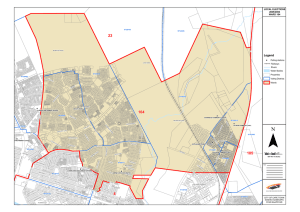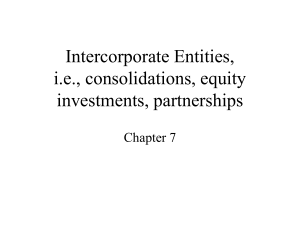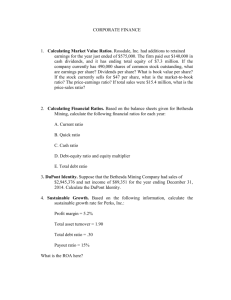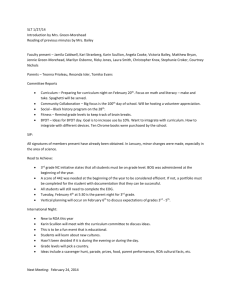Region of Attraction Comparison for Gradient Projection Anti-windup Compensated Systems Justin Teo
advertisement
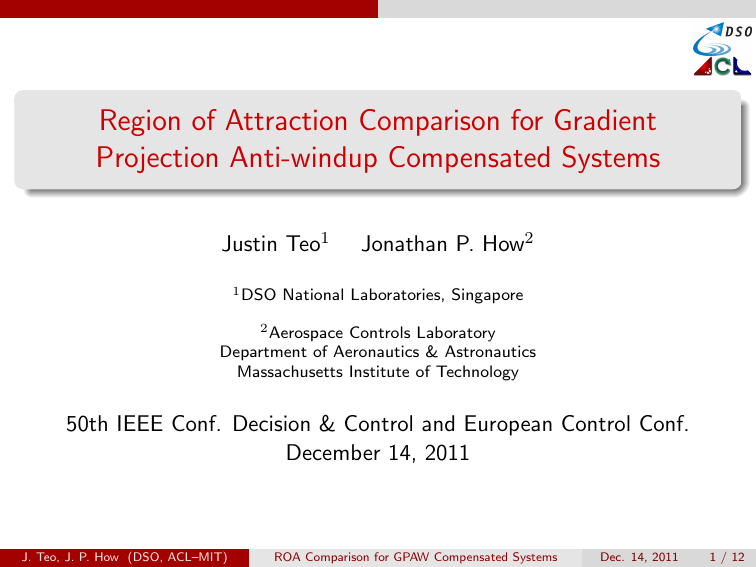
Region of Attraction Comparison for Gradient
Projection Anti-windup Compensated Systems
Justin Teo1
1 DSO
Jonathan P. How2
National Laboratories, Singapore
2 Aerospace
Controls Laboratory
Department of Aeronautics & Astronautics
Massachusetts Institute of Technology
50th IEEE Conf. Decision & Control and European Control Conf.
December 14, 2011
J. Teo, J. P. How (DSO, ACL–MIT)
ROA Comparison for GPAW Compensated Systems
Dec. 14, 2011
1 / 12
Outline
Outline
1
Motivation
2
GPAW Overview
3
General ROA Comparison
4
ROA Comparison for GPAW Compensated Systems
5
Conclusions and Future Work
J. Teo, J. P. How (DSO, ACL–MIT)
ROA Comparison for GPAW Compensated Systems
Dec. 14, 2011
2 / 12
Motivation
“Conventional” Anti-windup Problem
r
controller
u
sat(·)
plant
anti-windup
compensator
Given nominal plant and controller
J. Teo, J. P. How (DSO, ACL–MIT)
ROA Comparison for GPAW Compensated Systems
Dec. 14, 2011
3 / 12
Motivation
“Conventional” Anti-windup Problem
r
controller
u
sat(·)
plant
−
anti-windup
compensator
Given nominal plant and controller, design anti-windup compensator such
that [Tarbouriech and Turner 2009]:
unconstrained response recovered when no controls saturate
performance improved when some controls saturate
region of attraction (ROA) maximized when r ≡ 0
J. Teo, J. P. How (DSO, ACL–MIT)
ROA Comparison for GPAW Compensated Systems
Dec. 14, 2011
3 / 12
Motivation
“Conventional” Anti-windup Problem
r
controller
u
sat(·)
plant
−
anti-windup
compensator
Given nominal plant and controller, design anti-windup compensator such
that [Tarbouriech and Turner 2009]:
unconstrained response recovered when no controls saturate
performance improved when some controls saturate
region of attraction (ROA) maximized when r ≡ 0
Question
Can some solutions (corresponding to some initial conditions) that were
stable (uncompensated) become unstable with anti-windup?
J. Teo, J. P. How (DSO, ACL–MIT)
ROA Comparison for GPAW Compensated Systems
Dec. 14, 2011
3 / 12
Motivation
Maximizing ROA Not Adequate
r
controller
u
sat(·)
ROA: Rn
anti-windup
compensator
r
controller
plant
u
uncompensated
sat(·)
plant
compensated
Rn
−
anti-windup
compensator
J. Teo, J. P. How (DSO, ACL–MIT)
ROA: Raw
ROA Comparison for GPAW Compensated Systems
Dec. 14, 2011
4 / 12
Motivation
Maximizing ROA Not Adequate
r
controller
u
sat(·)
ROA: Rn
anti-windup
compensator
r
controller
plant
u
sat(·)
−
anti-windup
compensator
J. Teo, J. P. How (DSO, ACL–MIT)
Raw
plant
ROA: Raw
Rn
Maximizing ROA not
adequate
Want Raw ⊃ Rn
ROA Comparison for GPAW Compensated Systems
Dec. 14, 2011
4 / 12
Motivation
Maximizing ROA Not Adequate
r
controller
u
sat(·)
ROA: Rn
anti-windup
compensator
r
controller
plant
u
sat(·)
−
anti-windup
compensator
Raw
plant
ROA: Raw
Rn
Maximizing ROA not
adequate
Want Raw ⊃ Rn
Or Raw ⊃ Ω, where Ω ⊂ Rn
is an ROA estimate
J. Teo, J. P. How (DSO, ACL–MIT)
ROA Comparison for GPAW Compensated Systems
Dec. 14, 2011
4 / 12
Motivation
Maximizing ROA Not Adequate
r
controller
u
sat(·)
ROA: Rn
anti-windup
compensator
r
controller
plant
u
sat(·)
−
anti-windup
compensator
Raw
plant
ROA: Raw
Rn
Maximizing ROA not
adequate
Want Raw ⊃ Rn
Or Raw ⊃ Ω, where Ω ⊂ Rn
is an ROA estimate
Results for GPAW compensated planar LTI systems available [Teo and
How 2010a,c]. Develop similar results for MIMO nonlinear systems
J. Teo, J. P. How (DSO, ACL–MIT)
ROA Comparison for GPAW Compensated Systems
Dec. 14, 2011
4 / 12
GPAW Overview
Overview of GPAW Compensation
References [Teo and How 2009, 2010a,b,c,d, Teo 2011]
Gradient Projection Anti-windup (GPAW) scheme constructed for
saturated nonlinear MIMO plants driven by MIMO nonlinear
controllers
J. Teo, J. P. How (DSO, ACL–MIT)
ROA Comparison for GPAW Compensated Systems
Dec. 14, 2011
5 / 12
GPAW Overview
Overview of GPAW Compensation
References [Teo and How 2009, 2010a,b,c,d, Teo 2011]
Gradient Projection Anti-windup (GPAW) scheme constructed for
saturated nonlinear MIMO plants driven by MIMO nonlinear
controllers
For “strictly proper” nonlinear controllers
ẋc = fc (xc , y, r)
uc = gc (xc )
GPAW,Γ=ΓT >0
−−−−−−−−−−→
ẋg = RI ∗ (xg , y, r)fc (xg , y, r)
ug = gc (xg )
Projection operator RI ∗ projects controller state onto unsaturated
region K := {x | sat(gc (x)) = gc (x)}
J. Teo, J. P. How (DSO, ACL–MIT)
ROA Comparison for GPAW Compensated Systems
Dec. 14, 2011
5 / 12
GPAW Overview
Overview of GPAW Compensation
References [Teo and How 2009, 2010a,b,c,d, Teo 2011]
Gradient Projection Anti-windup (GPAW) scheme constructed for
saturated nonlinear MIMO plants driven by MIMO nonlinear
controllers
For “strictly proper” nonlinear controllers
ẋc = fc (xc , y, r)
uc = gc (xc )
GPAW,Γ=ΓT >0
−−−−−−−−−−→
ẋg = RI ∗ (xg , y, r)fc (xg , y, r)
ug = gc (xg )
Projection operator RI ∗ projects controller state onto unsaturated
region K := {x | sat(gc (x)) = gc (x)}
Achieves “controller state-output consistency”, a unique property:
sat(ug ) ≡ ug
or
sat(gc (xg )) ≡ gc (xg )
Extension of “conditional integration” method [Fertik and Ross 1967]
Can be realized in 3 equivalent ways (closed-form expressions also)
J. Teo, J. P. How (DSO, ACL–MIT)
ROA Comparison for GPAW Compensated Systems
Dec. 14, 2011
5 / 12
GPAW Overview
GPAW Scheme Visualization
Nominal controller:
ẋc = fc (xc , y, r)
fc2
fc1
uc = gc (xc )
H2 ∇h2
xg3
fc0
fc3
H 3(
K
f g3
Boundaries:
H1 , H2 , G3
xg1 f g1
fg2
)
H1
xg2
(x g3
ug = gc (xg )
∇h 1
∇h 3
GPAW controller:
ẋg = RI ∗ fc (xg , y, r)
xg0
)
J. Teo, J. P. How (DSO, ACL–MIT)
x g3
Unsaturated region:
Nominal update:
Projections:
G3
Gradients:
∇hi (xg ) = ±∇gci (xg )
K := {x̄ | sat(gc (x̄)) = gc (x̄)}
fci := fc (xgi , y(ti ), r(ti )) for xgi := xg (ti )
fgi := RI ∗ fci
ROA Comparison for GPAW Compensated Systems
Dec. 14, 2011
6 / 12
General ROA Comparison
General ROA Comparison Result
System: ẋ = f (x), equilibrium: xeq , solution from x0 : φ(t, x0 )
ROA: RA (xeq ) := {x | limt→∞ φ(t, x) = xeq }
ROA estimate: Ω ⊂ RA (xeq )
ROA estimate ΩV associated with Lyapunov function, V :
V (xeq ) = 0,
V (x) > 0, ∀x ∈ ΩV \ {xeq }
∂V (x)
f (x) ≤ −α(kx − xeq k), ∀x ∈ ΩV
V̇ (x) =
∂x
M is positively invariant if forward solution starting in M stays in M
J. Teo, J. P. How (DSO, ACL–MIT)
ROA Comparison for GPAW Compensated Systems
Dec. 14, 2011
7 / 12
General ROA Comparison
General ROA Comparison Result
System: ẋ = f (x), equilibrium: xeq , solution from x0 : φ(t, x0 )
ROA: RA (xeq ) := {x | limt→∞ φ(t, x) = xeq }
ROA estimate: Ω ⊂ RA (xeq )
ROA estimate ΩV associated with Lyapunov function, V :
V (xeq ) = 0,
V (x) > 0, ∀x ∈ ΩV \ {xeq }
∂V (x)
f (x) ≤ −α(kx − xeq k), ∀x ∈ ΩV
V̇ (x) =
∂x
M is positively invariant if forward solution starting in M stays in M
Lemma (ROA Comparison for General Systems)
Assume xeq is asymptotically stable equilibrium for two autonomous
systems ẋ = f1 (x) and ẋ = f2 (x). Let RA1 (xeq ) and RA2 (xeq ) be
associated ROAs. Let ΩV ⊂ RA1 (xeq ) be ROA estimate associated with
Lyapunov function V . If Ω2 ⊂ ΩV is positively invariant for ẋ = f2 (x) and
∂V (x)
∂V (x)
∂x f2 (x) ≤ ∂x f1 (x) for all x ∈ Ω2 , then Ω2 ⊂ RA2 (xeq )
J. Teo, J. P. How (DSO, ACL–MIT)
ROA Comparison for GPAW Compensated Systems
Dec. 14, 2011
7 / 12
ROA Comparison for GPAW Compensated Systems
An ROA Comparison Result
Plant, Σp
ẋ = f (x, sat(u))
Nominal Controller, Σc
ẋc = fc (xc , y)
y = g(x, sat(u))
u = gc (xc )
J. Teo, J. P. How (DSO, ACL–MIT)
GPAW Controller, Σgpaw
ẋg = RI ∗ fc (xg , y)
u = gc (xg )
ROA Comparison for GPAW Compensated Systems
Dec. 14, 2011
8 / 12
ROA Comparison for GPAW Compensated Systems
An ROA Comparison Result
Plant, Σp
ẋ = f (x, sat(u))
Nominal Controller, Σc
ẋc = fc (xc , y)
GPAW Controller, Σgpaw
ẋg = RI ∗ fc (xg , y)
y = g(x, sat(u))
u = gc (xc )
u = gc (xg )
n
Assume zeq ∈ R × (K \ ∂K) is asymptotically stable for Σn and Σg
Nominal System:
Σn : Σ p + Σ c
ROA: Rn (zeq )
GPAW System: Σg : Σp + Σgpaw ROA: Rg (zeq )
J. Teo, J. P. How (DSO, ACL–MIT)
ROA Comparison for GPAW Compensated Systems
Dec. 14, 2011
8 / 12
ROA Comparison for GPAW Compensated Systems
An ROA Comparison Result
Plant, Σp
ẋ = f (x, sat(u))
Nominal Controller, Σc
ẋc = fc (xc , y)
GPAW Controller, Σgpaw
ẋg = RI ∗ fc (xg , y)
y = g(x, sat(u))
u = gc (xc )
u = gc (xg )
n
Assume zeq ∈ R × (K \ ∂K) is asymptotically stable for Σn and Σg
Nominal System:
Σn : Σ p + Σ c
ROA: Rn (zeq )
GPAW System: Σg : Σp + Σgpaw ROA: Rg (zeq )
ROA estimate: ΩV = {z̄ | V (z̄) ≤ c} ⊂ Rn (zeq ) for some Lyapunov
function V (z) = V (x, xc ) of Σn
J. Teo, J. P. How (DSO, ACL–MIT)
ROA Comparison for GPAW Compensated Systems
Dec. 14, 2011
8 / 12
ROA Comparison for GPAW Compensated Systems
An ROA Comparison Result
Plant, Σp
ẋ = f (x, sat(u))
Nominal Controller, Σc
ẋc = fc (xc , y)
GPAW Controller, Σgpaw
ẋg = RI ∗ fc (xg , y)
y = g(x, sat(u))
u = gc (xc )
u = gc (xg )
n
Assume zeq ∈ R × (K \ ∂K) is asymptotically stable for Σn and Σg
Nominal System:
Σn : Σ p + Σ c
ROA: Rn (zeq )
GPAW System: Σg : Σp + Σgpaw ROA: Rg (zeq )
ROA estimate: ΩV = {z̄ | V (z̄) ≤ c} ⊂ Rn (zeq ) for some Lyapunov
function V (z) = V (x, xc ) of Σn
Theorem (ROA Bounds for GPAW Compensated System)
If there exists a Γ = ΓT > 0 such that
∂V (x̄, x̄c )
∂V (x̄, x̄c )
RI ∗ fc ≤
fc ,
∂xc
∂xc
∀(x̄, x̄c ) ∈ ΩV ∩ (Rn × K)
then Σg with Γ has ROA satisfying (ΩV ∩ (Rn × K)) ⊂ Rg (zeq )
J. Teo, J. P. How (DSO, ACL–MIT)
ROA Comparison for GPAW Compensated Systems
Dec. 14, 2011
8 / 12
ROA Comparison for GPAW Compensated Systems
Observations on ROA Comparison
ROA comparison is relative to uncompensated system
If ΩV = Rn (zeq ), conclusion is Rn (zeq ) ∩ (Rn × K) ⊂ Rg (zeq )
J. Teo, J. P. How (DSO, ACL–MIT)
ROA Comparison for GPAW Compensated Systems
Dec. 14, 2011
9 / 12
ROA Comparison for GPAW Compensated Systems
Observations on ROA Comparison
ROA comparison is relative to uncompensated system
If ΩV = Rn (zeq ), conclusion is Rn (zeq ) ∩ (Rn × K) ⊂ Rg (zeq )
States loosely that ROA of Σg is “not less than” ROA estimate ΩV
(or ROA Rn (zeq ))
Specialized with additional assumptions (e.g. LTI) – yields LMI
conditions [Teo 2011]
J. Teo, J. P. How (DSO, ACL–MIT)
ROA Comparison for GPAW Compensated Systems
Dec. 14, 2011
9 / 12
ROA Comparison for GPAW Compensated Systems
Observations on ROA Comparison
ROA comparison is relative to uncompensated system
If ΩV = Rn (zeq ), conclusion is Rn (zeq ) ∩ (Rn × K) ⊂ Rg (zeq )
States loosely that ROA of Σg is “not less than” ROA estimate ΩV
(or ROA Rn (zeq ))
Specialized with additional assumptions (e.g. LTI) – yields LMI
conditions [Teo 2011]
Main condition:
∂V (x̄,x̄c )
∗
∂xc RI fc
≤
∂V (x̄,x̄c )
∂xc fc
independent of sat(·)
Can be used in two ways: comparison against ROA estimate of
unconstrained system or nominal system
Result is applicable to MIMO nonlinear systems, but likely
conservative
J. Teo, J. P. How (DSO, ACL–MIT)
ROA Comparison for GPAW Compensated Systems
Dec. 14, 2011
9 / 12
ROA Comparison for GPAW Compensated Systems
Application of ROA Comparison Result
Example nonlinear planar system [Khalil 2002]
(
ẋ = − sat(u)
(
ẋ = − sat(u)
Σn :
Σ
:
0,
if A1
gs
u̇ = x + (x2 − 1)u
u̇ =
2
x + (x − 1)u, otherwise
J. Teo, J. P. How (DSO, ACL–MIT)
ROA Comparison for GPAW Compensated Systems
Dec. 14, 2011
10 / 12
ROA Comparison for GPAW Compensated Systems
Application of ROA Comparison Result
Example nonlinear planar system [Khalil 2002]
(
ẋ = −u
(
ẋ = −u
Σu :
Σ
:
0,
if A1
g
u̇ = x + (x2 − 1)u
u̇ =
2
x + (x − 1)u, otherwise
Compare with ROA estimate ΩV of unconstrained system:
4
3
φu (t, z0 )
3
2
x
2
φg u(t, z0 )
1
0
1
−1
u
−2
0
0
1
2
3
4
0
1
2
3
4
5
6
7
8
9
10
5
6
7
8
9
10
2
ΩV
1
u
−1
−2
Rg u(zeq)
φu (t, z0 )
Ru (zeq )
φg u(t, z0 )
−3
−3
−2
−1
0
x
J. Teo, J. P. How (DSO, ACL–MIT)
1
2
0
−1
−2
3
time (s)
ROA Comparison for GPAW Compensated Systems
Dec. 14, 2011
10 / 12
ROA Comparison for GPAW Compensated Systems
Application of ROA Comparison Result
Example nonlinear planar system [Khalil 2002]
(
ẋ = −u
(
ẋ = −u
Σu :
Σ
:
0,
if A1
g
u̇ = x + (x2 − 1)u
u̇ =
2
x + (x − 1)u, otherwise
Compare with ROA estimate ΩV of unconstrained system:
4
3
φu (t, z0 )
3
2
x
2
φg u(t, z0 )
1
0
1
−1
u
−2
0
0
1
2
3
4
0
1
2
3
4
5
6
7
8
9
10
5
6
7
8
9
10
2
ΩV
1
u
−1
−2
Rg u(zeq)
φu (t, z0 )
Ru (zeq )
φg u(t, z0 )
−3
−3
−2
−1
0
x
1
2
0
−1
−2
3
time (s)
Toy example defeats methods for LTI systems, feedback linearizable
systems, and nonlinear anti-windup [Morabito et al. 2004]
J. Teo, J. P. How (DSO, ACL–MIT)
ROA Comparison for GPAW Compensated Systems
Dec. 14, 2011
10 / 12
Conclusions and Future Work
References I
H. A. Fertik and C. W. Ross. Direct digital control algorithm with anti-windup feature. ISA Trans., 6(4):317 – 328, 1967.
H. K. Khalil. Nonlinear Systems. Prentice Hall, Upper Saddle River, NJ, 3 edition, 2002.
F. Morabito, A. R. Teel, and L. Zaccarian. Nonlinear antiwindup applied to Euler-Lagrange systems. IEEE Trans. Robot.
Autom., 20(3):526 – 537, June 2004. doi: 10.1109/TRA.2004.824933.
S. Tarbouriech and M. Turner. Anti-windup design: an overview of some recent advances and open problems. IET Control
Theory Appl., 3(1):1 – 19, Jan. 2009. doi: 10.1049/iet-cta:20070435.
C. S. J. Teo. Gradient Projection Anti-windup Scheme. PhD thesis, Massachusetts Institute of Technology, Cambridge, MA,
Feb. 2011. URL http://hdl.handle.net/1721.1/63043.
J. Teo and J. P. How. Anti-windup compensation for nonlinear systems via gradient projection: Application to adaptive control.
In Proc. 48th IEEE Conf. Decision and Control & 28th Chinese Control Conf., pages 6910 – 6916, Shanghai, China, Dec.
2009. doi: 10.1109/CDC.2009.5400075.
J. Teo and J. P. How. Analysis of gradient projection anti-windup scheme. In Proc. American Control Conf., pages 5966 – 5972,
Baltimore, MD, June/July 2010a.
J. Teo and J. P. How. Geometric properties of gradient projection anti-windup compensated systems. In Proc. American Control
Conf., pages 5973 – 5978, Baltimore, MD, June/July 2010b.
J. Teo and J. P. How. Gradient projection anti-windup scheme on constrained planar LTI systems. Technical Report ACL10-01,
MIT, Cambridge, MA, Mar. 2010c. URL http://hdl.handle.net/1721.1/52600. Aerosp. Controls Lab.
J. Teo and J. P. How. Corrections to ‘geometric properties of gradient projection anti-windup compensated systems’. Technical
Report ACL10-02, MIT, Cambridge, MA, June 2010d. URL http://hdl.handle.net/1721.1/56001. Aerosp. Controls Lab.
J. Teo, J. P. How (DSO, ACL–MIT)
ROA Comparison for GPAW Compensated Systems
Dec. 14, 2011
11 / 12
Conclusions and Future Work
Conclusions and Future Work
Maximizing ROA not adequate - want Rn ⊂ Raw
Developed ROA comparison result for general systems
Specialized to GPAW compensated saturated MIMO nonlinear
systems
Toy example defeats 3 classes of state-of-the-art anti-windup methods
Current result still likely conservative
Plenty of work to find qualitatively similar but less conservative results
J. Teo, J. P. How (DSO, ACL–MIT)
ROA Comparison for GPAW Compensated Systems
Dec. 14, 2011
12 / 12
Conclusions and Future Work
Conclusions and Future Work
Maximizing ROA not adequate - want Rn ⊂ Raw
Developed ROA comparison result for general systems
Specialized to GPAW compensated saturated MIMO nonlinear
systems
Toy example defeats 3 classes of state-of-the-art anti-windup methods
Current result still likely conservative
Plenty of work to find qualitatively similar but less conservative results
For more information on GPAW compensation
http://acl.mit.edu/projects/gpaw.htm
http://dspace.mit.edu/handle/1721.1/63043
J. Teo, J. P. How (DSO, ACL–MIT)
ROA Comparison for GPAW Compensated Systems
Dec. 14, 2011
12 / 12
Conclusions and Future Work
Conclusions and Future Work
Maximizing ROA not adequate - want Rn ⊂ Raw
Developed ROA comparison result for general systems
Specialized to GPAW compensated saturated MIMO nonlinear
systems
Toy example defeats 3 classes of state-of-the-art anti-windup methods
Current result still likely conservative
Plenty of work to find qualitatively similar but less conservative results
For more information on GPAW compensation
http://acl.mit.edu/projects/gpaw.htm
http://dspace.mit.edu/handle/1721.1/63043
Questions?
J. Teo, J. P. How (DSO, ACL–MIT)
ROA Comparison for GPAW Compensated Systems
Dec. 14, 2011
12 / 12
Backup Slides
ROAs of Saturated Planar LTI Systems, Rn ⊂ Rg
Unstable plant, stable controller
Symmetric constraints
Asymmetric constraints
5
5
φn (t, z0 )
4
φn (t, z0 )
4
φg (t, z0 )
φg (t, z0 )
3
3
2
2
1
Rn = Rg
0
u
u
1
Rg
0
−1
−1
−2
−2
−3
−3
−4
−4
−5
−2.5
−5
−2.5
−2
−1.5
−1
−0.5
0
0.5
x
1
1.5
2
2.5
Rn
−2
−1.5
−1
−0.5
0
x
0.5
1
1.5
2
2.5
Stable plant, unstable controller
3
Rn
2
Rg
u
1
0
−1
φn (t, z0 )
−2
φg (t, z0 )
−3
−5
J. Teo, J. P. How (DSO, ACL–MIT)
−4
−3
−2
−1
0
x
1
2
3
4
5
ROA Comparison for GPAW Compensated Systems
Dec. 14, 2011
13 / 12
Backup Slides
ROA Comparison Indicates True Advantage
Existing anti-windup results are in “absolute” sense
may not indicate any advantages of anti-windup scheme
ROA comparison result is in “relative” sense
directly shows advantage of GPAW scheme
first in new anti-windup paradigm
J. Teo, J. P. How (DSO, ACL–MIT)
ROA Comparison for GPAW Compensated Systems
Dec. 14, 2011
14 / 12
Backup Slides
ROA Comparison Indicates True Advantage
Existing anti-windup results are in “absolute” sense
may not indicate any advantages of anti-windup scheme
ROA comparison result is in “relative” sense
directly shows advantage of GPAW scheme
first in new anti-windup paradigm
States loosely that ROA of Σg is not less than ROA estimate ΩV
Applies for asymmetric saturation constraints
Specialized with additional assumptions (e.g. LTI)
J. Teo, J. P. How (DSO, ACL–MIT)
ROA Comparison for GPAW Compensated Systems
Dec. 14, 2011
14 / 12
Backup Slides
ROA Comparison Indicates True Advantage
Existing anti-windup results are in “absolute” sense
may not indicate any advantages of anti-windup scheme
ROA comparison result is in “relative” sense
directly shows advantage of GPAW scheme
first in new anti-windup paradigm
States loosely that ROA of Σg is not less than ROA estimate ΩV
Applies for asymmetric saturation constraints
Specialized with additional assumptions (e.g. LTI)
Main condition:
∂V (x̄,x̄c )
∗
∂xc RI fc
≤
∂V (x̄,x̄c )
∂xc fc
independent of sat(·)
Can be used in two ways: comparison against ROA estimate of
unconstrained system or nominal system
J. Teo, J. P. How (DSO, ACL–MIT)
ROA Comparison for GPAW Compensated Systems
Dec. 14, 2011
14 / 12
